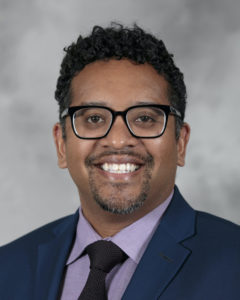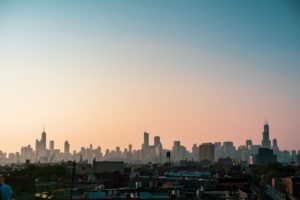
Andrew Gonzalez, MD, had a heart for underserved and under- resourced communities embedded early. The son of a pediatric hematologist mother who worked at Cook County Hospital in Chicago for 31 years, his mom spent a lot of her time treating large numbers of the city’s indigent population. It was a parental backdrop that had so much of an impact, it would eventually lead Gonzalez into vascular surgery.
“It was one of the only two Chicago Hospitals that poor Black patients could have care back when she first started there in the 1960s,” explains Gonzalez, an assistant professor of surgery and research scientist at the Indiana University School of Medicine, division of vascular surgery. “I grew up in medicine. With my mother’s practice at County being what it was, an under- resourced hospital providing so much care to poor, minority and immigrant patients, my perspective on American medicine in general as well as the needs of disenfranchised populations probably is a little different than most physicians.”
His own minority background—half-Black, half-Filipino—is something he identifies as atypical in the popular imagination: That is to say, he was raised by an African American single mother after his Filipino father abandoned the family early shortly after his birth, Gonzalez says.
Deeper still, healthcare and academia both run deep in his family. On the maternal side his lineage descends from a Scotsman who immigrated to the Caribbean island nation of St. Kitts and Nevis. That branch of the family tree landed on the shores of the U.S. His great-great-grandmother, a midwife, immigrated from St. Kitts to New York City to take over the practice of an obstetrician who, as family legend has it, returned to Germany to fight for the Kaiser in World War I. His grandfather—the descendent of enslaved people—had the opportunity to attend a master’s program at NYU after their family sold their prized hog in a small town in Kentucky. There, his grandfather met his grandmother while studying literary criticism of early African American writings.
Then his mother picked back up the healthcare thread, heading to medical school at the historically Black college of Howard University in Washington, D.C., during the era of segregation.
All of which set the stage for Gonzalez to assume the mantle of a family tradition. Almost inevitably, that would mean at some point a research focus on healthcare disparities. Before assuming his current role, he had undertaken a research fellowship at the University of Michigan.
“During this time, I published a few papers on disparities in outcomes for certain patients,” he says. “One of them looked at a national study evaluating hospital volume and inpatient mortality after open AAAs [abdominal aortic aneurysms] in vulnerable patients. We defined ‘vulnerable’ patients as Black or low socio-economic status.”

Gonzalez said they found that while there seemed to be a volume-outcome effect for all patients undergoing major surgery, Black patients had disproportionately worse outcomes in low-volume hospitals. Aside from the main finding, Gonzalez emphasized the study highlights: “There are very complex relationships between race, socioeconomic status and hospital factors,” going on to say that “gaining a deep understanding of how to improve disparities in healthcare—and in the country in general—is not just a matter of slapping some paint on something and doing whatever is a quick fix. For some of the underlying factors, we don’t even know why they’re happening, much less what to do about them.”
Away from the science, Gonzalez describes his version of the all-too-familiar experience of being Black on campus. “A lot of people have the idea that, ‘Well, you’re a doctor, so it’s different.’ Sure, in the hospital, and maybe if people know who you are and if they’re too afraid to say something overtly racist. But, even in surgery residency, you have to leave the hospital at some point. When that happens, you’re just another Black guy on the street. I’ve been hassled, clearly followed, for walking while Black. Not arrested, not charged.”
Gonzalez sees such frivolous interactions as indicative of the “pretense” suffered by minorities—“meaning some people in authority take an action that’s seemingly in their power, but they’re doing it for ulterior motives. Rules that no one anywhere is ever hassled for … like jaywalking on an internal campus street. Can you really jaywalk on a non-public street? Or was that just an excuse to see my ID and run a background.”
Back on the subject of working toward fixing disparities in healthcare outcomes, Gonzalez recalls the example of his mother once more.
“She gave out vaccinations,” he says. “The hospital would drive doctors and nurses into the neighborhoods and give people polio vaccines and stuff like that. Now it’s not really possible to do some of those things given everybody’s work schedules, administrative requirements, and the general corporatization and depersonalization in modern healthcare delivery.”
For vascular surgery in particular, for conditions such as peripheral arterial disease and end-stage renal disease, a number of social determinants of health play into outcomes, Gonzalez argues. “I don’t think that the outreach from our organized vascular societies is as robust as it could be. For all we know it might be a better vascular public health intervention to send docs out to the barber shops and do education on PAD like the urologist did for prostate cancer in African American men, but I don’t think the sense of urgency/excitement exists around that compared to say doing outreach in other countries.”
That is the philanthropic side of medicine as he understands it.
“Growing up in the inner-city with a single mother and looking outside of our window—we had to live close to Cook County Hospital because there wasn’t really babysitting or any of that—on the weekends for the clinic, the line would wrap around the entire block. I’m not 100% certain why our [surgical] societies don’t have widespread organized outreach efforts within the United States as opposed to always going to other countries and doing it.”












